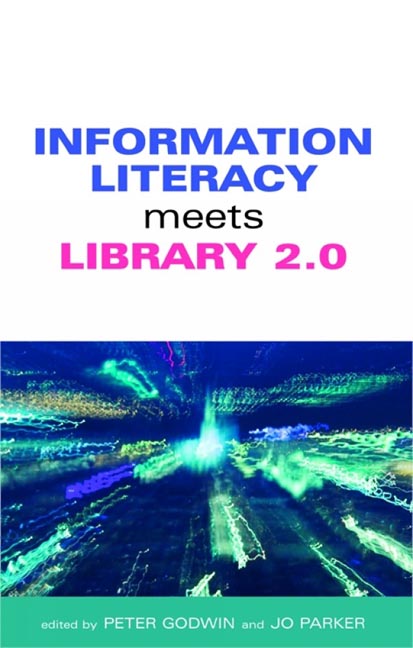Book contents
- Frontmatter
- Contents
- Contributors
- Acknowledgements
- Part 1 The basics 1
- Part 2 Library 2.0 and the implications for IL learning 37
- Part 3 Library 2.0 and IL in practice 75
- 6 Engage or enrage: the blog as an assessment tool
- 7 Using Wikipedia to eavesdrop on the scholarly conversation
- 8 Information literacy and RSS feeds at LSE
- 9 Library instruction on the go: podcasting at the Kresge Library
- 10 PennTags at the University of Pennsylvania
- 11 Sparking Flickrs of insight into controlled vocabularies and subject searching
- 12 Joining the YouTube conversation to teach information literacy
- 13 Going Beyond Google at The Open University
- 14 Using Web 2.0 to enhance the Staffordshire University Assignment Survival Kit (ASK)
- Part 4 The future
- Index
13 - Going Beyond Google at The Open University
from Part 3 - Library 2.0 and IL in practice 75
Published online by Cambridge University Press: 08 June 2018
- Frontmatter
- Contents
- Contributors
- Acknowledgements
- Part 1 The basics 1
- Part 2 Library 2.0 and the implications for IL learning 37
- Part 3 Library 2.0 and IL in practice 75
- 6 Engage or enrage: the blog as an assessment tool
- 7 Using Wikipedia to eavesdrop on the scholarly conversation
- 8 Information literacy and RSS feeds at LSE
- 9 Library instruction on the go: podcasting at the Kresge Library
- 10 PennTags at the University of Pennsylvania
- 11 Sparking Flickrs of insight into controlled vocabularies and subject searching
- 12 Joining the YouTube conversation to teach information literacy
- 13 Going Beyond Google at The Open University
- 14 Using Web 2.0 to enhance the Staffordshire University Assignment Survival Kit (ASK)
- Part 4 The future
- Index
Summary
The explosion in Web 2.0 tools, the number of blogs, and the increase in MySpace pages are stark indicators that the environment in which information professionals are operating looks very different from the way it looked as recently as two years ago. At the Open University (OU) Library we have responded to these changes by producing a new course, TU120 Beyond Google, in collaboration with academic colleagues from the Faculty of Technology.
Background
Between 2002 and 2005 the OU offered a course called U120 MOSAIC (Making Sense of Information in the Connected Age). Beyond Google started life as a suggestion for an updated version of U120. However, it quickly became clear that what we had intended as a relatively straightforward ‘refreshing’ of the U120 content wasn't appropriate given the marked changes in the information landscape. Beyond Google includes more typically ‘academic’ content, rather than revolving around skills development, which had been our focus with U120. It was inevitable, then, that the course should feature some of the Web 2.0 tools that are becoming part and parcel of our interactions with information. We have, however, tried to take a holistic view, where the tools are inseparable from the skills, and have been able to introduce students to a range of Web 2.0 technologies as a result.
Beyond Google sits within the OU's Relevant Knowledge programme, which includes other short courses on such diverse topics as digital photography and computer security. The course is worth ten points at level one (entry level). Given the subject matter, it is also entirely online, with support provided by a team of moderators via a system of online forums. The course runs over ten weeks twice a year, in October and May. One considerable benefit of working within the OU's course production system is the luxury of teaching time. A short course at the OU lasts 100 hours over ten weeks, as opposed to the 45 minutes many of us are used to when meeting students at induction. This has given us opportunities to explore technologies and develop activities that we had not previously been able to consider, not least of which is persuading students to explore the possibilities of search beyond search engines, hence the course name.
- Type
- Chapter
- Information
- Information Literacy Meets Library 2.0 , pp. 133 - 138Publisher: FacetPrint publication year: 2008
- 2
- Cited by



